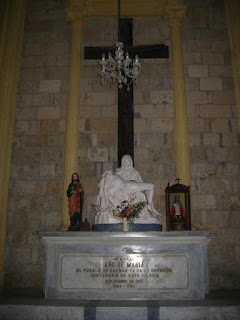corpus christi
What makes a sacrifice a sacrifice?
St. Thomas Aquinas said that a sacrifice requires two things. First there is the oblation, and second there
is the immolation. These are the two
points which I would like to reflect with you today on this feast of the Corpus
Christi – the feast of the sacrifice of Jesus on the cross which we make
present daily on our altars in the sacrifice of the mass. The two requirements for a sacrifice – there
must be oblation and in that oblation there must be immolation.
First – oblation. What is
oblation? Oblation is a gift and a gift
is something that is freely given. It is
not something coerced, there is no intimidation involved, no bullying. It may be asked but it is not and could not
be demanded or required. It is something
freely given, it is volunteered, it may be given quite reluctantly at first but
in the end it is surrendered.
The sacrifice of Jesus on the cross on Calvary was a sacrifice because
Jesus made a gift of himself. Jesus was
not simply killed. If he was killed, if
he died, it was because he voluntarily offered his life in obedience to the
will of the Father. So a sacrifice requires
an oblation, a gift freely given.
But what is the second requirement?
What is immolation? Immolation
means transformation. It means that a
change must occur. The oblation must be
transformed from one state to another.
Jesus’ oblation, his free offering of himself was immolation – he was
alive, now he is dead; he was full of vitality, now one can only see a lifeless
body. Immolation – a transformation has
occurred. A sacrifice has indeed
happened.
Today and every Sunday we celebrate the sacrifice of the mass. It is not a repetition of the sacrifice of
Jesus. Rather we make present the
sacrifice of our Lord so that we can join our own sacrifices to that of our
Lord, so that he can make our sacrifices holy.
And so we ask, when we come to church to celebrate the sacrifice of the
Lord, do we bring with us the sacrifices which we have made for the Lord?
Sacrifices first of all are oblations – they are gifts freely
given. It is not coerced. It is volunteered. It may be asked, it may be demanded but in
the end it is something surrendered willingly.
But this is not yet sacrifice because a gift freely given is to be
accompanied by immolation – transformation and change – life to death, pleasure
to pain, convenience to inconvenience, relaxation to tension and
tiredness, from having to losing, from
something to nothing. Something is
changed.
Without being asked, you walked the extra mile even if the road becomes
rough and the going becomes tough.
Without the promise of compensation, you gave the best part of yourself,
even if it remained unnoticed, unrecognized and unrewarded. Without threats and coercion, you came to
help and alleviate even if it involved tiredness, probably pain, and sorrow and
even sometimes regret. May we celebrate
the corpus christi, the sacrifice of Jesus not just at this hour but every
hour, not just in this place but wherever we are.

Comments